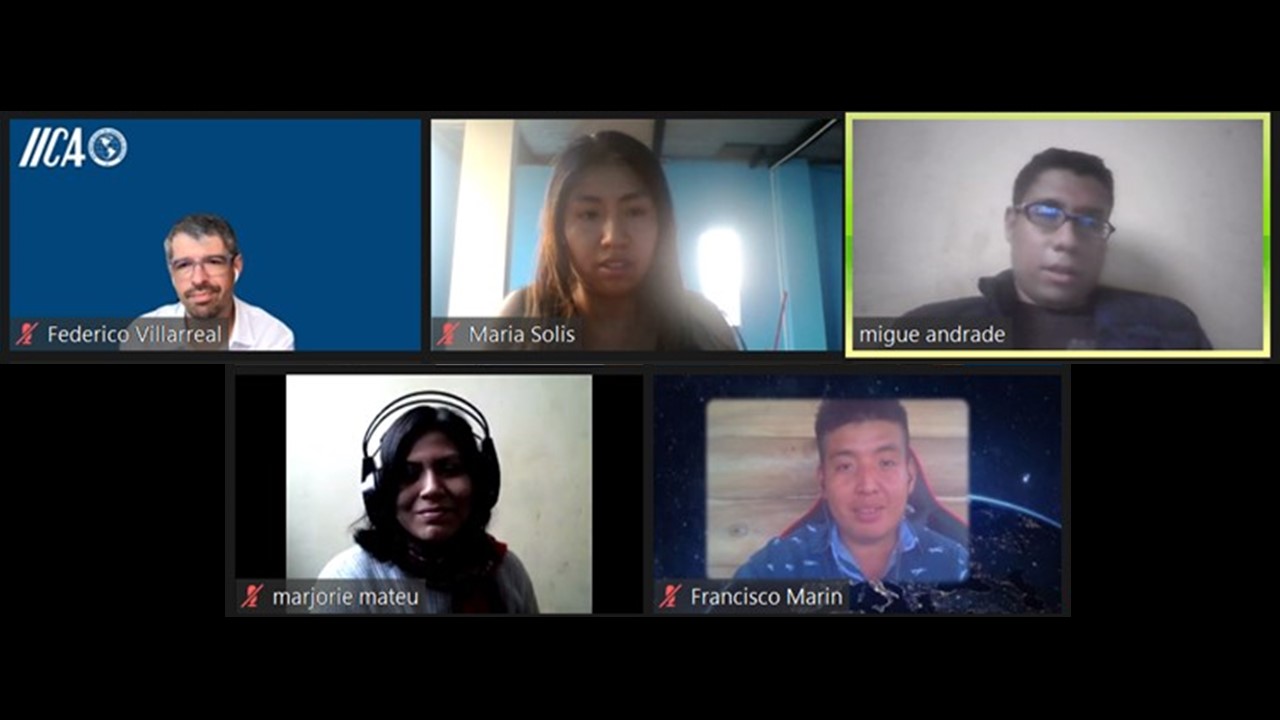Physics, biology and IT professionals won the 2021 Rural Youth Hackathon organized by IICA for this purpose.

San Jose, 5 November 2021 (IICA). Four young adults from the Andean region won the 2021 Rural Youth Hackathon organized by the Inter-American Institute for Cooperation on Agriculture (IICA) with the aim to develop a virtual tool to create and connect a Rural Youth Community of the Americas.
The winning team was called Chagüite and was selected from a total of 8 teams and 51 participants from Brazil, Colombia, Ecuador, Haiti, Honduras, Mexico, Nicaragua, Paraguay and Peru.
Lima natives Miguel Andrade, a physicist and student of computer science; María Solís, a biologist and Master of biomedical informatics; and biologist Marjorie Mateu; as well as Francisco Marín, a computer technician from Manabí, Ecuador, comprised the winning team.
Their project consisted of a platform called B-Lama, which functions as both a professional website and a native application on a number of devices, meaning it can work on any operating system.
The digital tool offers spaces for interaction for those who register using a form, including the forum and blog sections, which allow users to share personal content and experiences with other young people in the Hemisphere and post that content to different social networking sites; the storefront aimed at the commercial exchange of agricultural products and at strengthening the entrepreneurial spirit; and, lastly, the education area.
The platform aims to build virtual and in-person communities, forging alliances among the rural youth. B-Lama is not limited to just young people, however, and can also be used by a number of actors across the agriculture chain, including farmers, transporters, suppliers and other professionals.
“It represents joint work and offers solutions both with young people and for young people; this is key and one of the essential elements of the Hackathon initiative”, explained Federico Villareal, Director of Technical Cooperation at IICA, about the contest promoted by IICA with the support of Bayer, Cenfotec, Creativa de Costa Rica and Zamorano universities, the Alliance for Entrepreneurship and Innovation (AEI) in Ecuador, the Latin American Organization of Young Agri-entrepreneurs (OLAJ), I4NATURE and 4-H.
“The platform allows for and facilitates social and economic interaction and idea sharing; it is a space for networking and dialogue from and for young people; but it is not open to them only, but also to a wide range of actors across the agrifood chain, which is extremely important”, he added.
The winning group will receive USD 4,000 and a certificate of recognition for their participation and victory.
“We strived to create an innovative idea that would contribute to the agricultural sector, because I myself am from the countryside. It is a digital tool focused directly on creating a community in the most user-friendly way possible, with a subtle mix of agriculture so that everyone can feel comfortable; it is simple yet useful and allows IICA to fulfil its objective”, commented young Francisco Marín.
“Seeing how technology can be implemented in agriculture is very important; I’m very excited to be able to participate in this project and to share and apply my knowledge. It was a challenging experience, but we were able to integrate different points of view, including that of women in agriculture”, explained Marjorie Mateu.
The Rural Youth Community of the Americas promoted by IICA will be important in changing the crude reality and enormous challenges young people face and in removing the barriers to access to education, technology, employment, productive resources, landholding and health services, among others, made worse by the pandemic.
More information:
Mariela Zúñiga, Coordinator of the Gender and Youth Cross-Cutting Area of Focus at IICA.
mariela.zuniga@iica.int
Ileana Ramírez, Consultant and Specialist in Gender and Youth at IICA.
ileana.ramirez.consultora@iica.int











